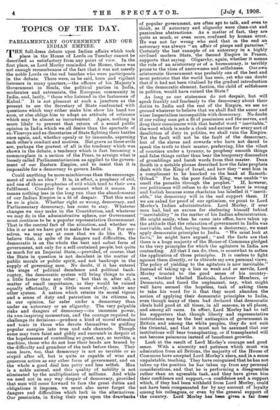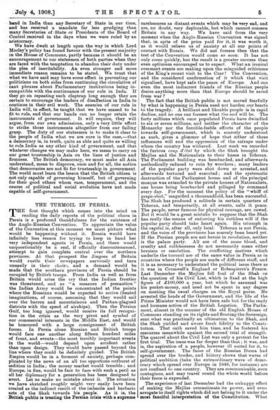TOPICS OF THE DAY.
PARLIAMENTARY GOVERNMENT AND OUR INDIAN EMPIRE. THE full-dress debate upon Indian affairs which took place in the House of Lords on Tuesday cannot be described as satisfactory from any point of view. In the first place, as Lord Morley reminded the House, there was not enough remembrance of the fact that it was not merely the noble Lords on the red benches who were participants in the debate. There were, as be said, keen and vigilant listeners in many quarters,—the officers of his Majesty's Government in Simla, the political parties in India, moderates and extremists, the European community in India, and, lastly, "those who listened in the fastnesses of Kabul." It is not pleasant at such a juncture as the present to see the Secretary of State confronted with questions which may either make him show his hand too soon, or else oblige him to adopt an attitude of reticence which may be almost as inconvenient. Again, nothing is more likely to prevent that return of a sound public opinion in India which we all desire than the spectacle of ex-Viceroys and ex-Secretaries of State fighting their battles once again, and, whether openly or by innuendo, aspersing each other's conduct and motives. But grave as these evils are, perhaps the gravest of all is the tendency which was shown in the debate, a tendency which is fast becoming a commonplace in a section of the Press, to arraign what is loosely called Parliamentarianism as applied to the govern- ment of our Eastern Empire, and to insist that it is impossible for a democracy to govern India.
Could anything be more mischievous than the encourage- ment of such an idea ? It is, in effect, a. prophecy of evil, and one of those prophecies of evil which tend to their own fulfilment. Consider for a moment what it means. It means nothing less in the long run than the abandonment of our Indian Empire in a fit of despair. That this must be so is plain. Whether right or wrong, democracy, and Parliamentary democracy, has come to stay. Whatever changes we may make in the Constitution, and whatever we may do in the administrative sphere, our Government must continue to be a popular representative Government. That is the central fact of the situation, and whether we like it or not we have got to make the best of it. For our- selves, we may say at once that we do like it. We believe that, in spite of its dangers and difficulties, the democratic is on the whole the best and safest form of government, not only for a self-contained people, but quite as much for an Imperial State,—provided, of course, that the State in question is not decadent in the matter of public morals or public spirit, and not bankrupt in the supply of governing men. No doubt, if it has entered the stage of political decadence and political bank- ruptcy, the democratic system will bring things to ruin a little faster than any other ; but that is, after all, a matter of small importance, as they would be ruined equally effectually, if a little more slowly, under any other system. A nation which retains its moral vigour and a sense of duty and patriotism in its citizens is, in our opinion, far safer under a democracy than under an autocracy or an oligarchy. The very palpable risks and dangers of democracy—its immense power, its awe-inspiring momentum, and the courage required to challenge its decisions—produce a kind of moral stimulus and tonic in those who devote themselves to guiding popular energies into true and safe channels. Though some may turn faint and giddy and succumb in despair at the hopelessness of controlling so great, nay, so terrible, a machine, those who do not lose their heads are braced by the difficulty and grandeur of the task before them. They soon learn, too, that democracy is not so terrible or so stupid after all, but is quite as capable of wise and generous action as any other form of government, and on the whole a good deal less petty and less selfish. Man is a noble animal, and this quality of nobility is not eliminated by the multiplication of millions. And while we need not in any way despair of democracy, provided that men will come forward to face the great duties and obligations it imposes, we must also never forget the dangers and difficulties which lurk in the alternatives. Our pessimists, in fixing their eyes upon the drawbacks of popular government, are often apt to talk, and even to think, as if autocracy and oligarchy were clean-cut and passionless abstractions. As a matter of fact, they are quite as much, or even more, confused by human error. He was not far wrong who said that in the end an autocracy was always "an affair of pimps and parasites.', Certainly the last example of an autocracy in a highly civilised modern State, the Second Empire in France, supports that saying. Oligarchy, again, whether it means the rule of an aristocracy or of a bureaucracy, is terribly prone to the vices of narrowness and selfishness. Our own aristocratic Government was probably one of the best and most patriotic that the world has seen, yet who can doubt that if it had not been vitalised by the gradual introduction of the democratic element, faction, the child of selfishness in politics, would have ruined the State ?
As long as our statesmen do not despair, but will speak frankly and fearlessly to the democracy about their duties to India and the rest of the Empire, we see no ground whatever to believe that we shall find the saner and wiser Imperialism incompatible with democracy. No doubt if our ruling men get a fit of pessimism and the nerves, and drug their consciences with that hateful word "inevitable," the word which is made a cloak and excuse for every sort of dereliction of duty in politics, we shall ruin the Empire. Yet the fault will not be the fault of the democracy, but of the slaves and cowards who have not dared to speak the truth to their master, preferring, like the vilest of courtiers under a tyranny, to prophesy smooth things and false things rather than bear the temporary discomfort of grumblings and harsh words from that master. Dean South in a notable phrase described how the false prophets dealt with the King of Israel, and how they "sent him in a compliment to be knocked on the head at Ramoth- Gilead." For he, the poor foolish King, was unable" to smell the parasite through the prophet." If, however, our politicians will refuse to do what they know is wrong and foolish because some charlatan has labelled it "inevit- able," the democracy will in the end support them. If we are asked for proof of our optimism, we point to Lord Morley's Indian administration. Lord Morley, if ever man had, had an excuse for sheltering himself behind " inevitability " in the matter of his Indian administration. He might easily, when he came into office, have taken up the attitude that the relaxation of government in India was inevitable, and that, having become a deniocracy, we must apply democratic principles to India. "We must look at facts," he might have argued ; "and the facts are that there is a huge majority of the House of Commons pledged to the very principles for which the agitators in India are contending. All that I can do, then, is somewhat to soften the application of those principles. It is useless to fight against them directly, or to obtrude my own personal views. The policy of yielding to the agitators is now inevitable." Instead of taking up a line so weak and so servile, Lord Morley trusted to the good sense of his -country- men, whether labelled Radicals, Labour Members, or Democrats, and faced the unpleasant, nay, what might well have seemed the hopeless, task of asking them to take his word for it that they must abandon the notion of applying their democratic principles to India, even though many of them had declared that democratic ideals hold good at all times, in all seasons, in all places, and among all races. In effect, Lord Morley had to tell his supporters that though liberty and representative institutions may be the best antiseptics of government in Britain and among the white peoples, they do not suit the Oriental, and that it must not be assumed that our institutions will bear transplanting, or if transplanted will not become poisonous instead of beneficent growths.
Look at the result of Lord Morley's courage and good sense. With a sincerity and patience which must win admiration from all Britons, the majority of the House of Commons have accepted Lord Morley's stern, and in a sense unpalatable, teaching. They have recognised that he has not taken up the position he has taken up from any personal considerations, and that be is performing a disagreeable rather than an agreeable task, and they have given him their confidence and support,—a confidence and a support which, if they had been withheld from Lord Morley, could not have been compensated for by any amount of loyalty among his colleagues, or even by the general support of the country. Lord Morley has been given a far freer • hand in India than any Secretary of State in our time, and • has received a mandate far less grudging than many Secretaries of 'State or Presidents of the Board of Control received in the days when we were ruled by an • aristocracy.
We have dwelt at length upon the way in which Lord • Morley's policy has found favour with the present majority in the House of Commons, partly because it should be an • , encouragement to our statesmen of both parties when they are faced with the temptation to abandon their duty under the plea of inevitability. An even stronger and more • immediate reason remains to be stated. We trust that • what we have said may have some effect in preventing our . politicians on both sides from continuing the circulation of • cant phrases about Parliamentary institutions being in- compatible with the continuance of our rule in Inds.. If they go on repeating such claptrap long enough they are certain to encourage the leaders of disaffection in India to • continue in their evil work. The enemies of our rule in India will, in effect, be taught that we have ceased to be fit to rule, and that our hands can no longer retain the instruments of government. It will require, they will argue, from our own admissions, only a very little effort to strike those instruments altogether from our failing grasp. V The duty of our statesmen is to make it clear to the people of India what we are sure is the case,—that a democracy is, in truth, quite as able and quite as willing to rule India as any other kind of government, and that whatever changes we may make here, we mean to carry on our great trusteeship in Asia on the lines of justice and firmness. The British democracy, we must make all Asia understand, mean to disprove, once and for all, the notion that democracies are not fit for trusteeship in government. The world must learn the lesson that the British citizen is not only capable of governing himself, but of governing for their good others whom race, temperament, and the course of political and social evolution have not made capable of self-government.



















































 Previous page
Previous page